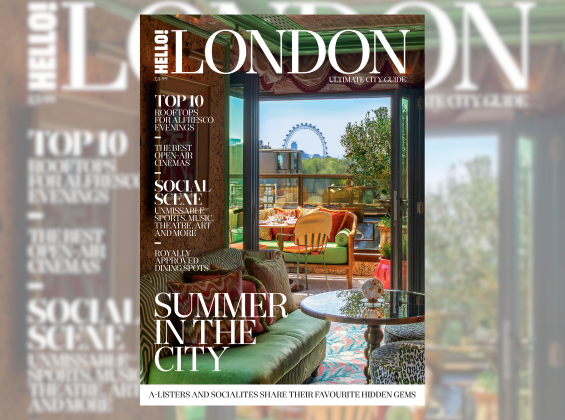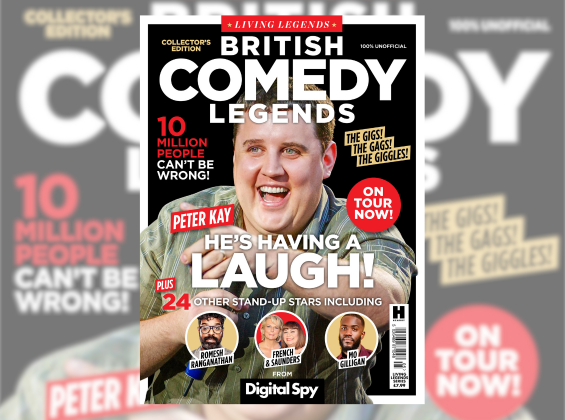
HELLO! launch standalone franchise
HELLO! London is the premium bi-annual field guide to the UK’s capital.
Industry News
Industry News
Tom Hawkins breaks down the PPA Live! In Pods We Trust virtual event to highlight the key takeaways for publishers looking to start a podcast.
Lo-fi and low-cost, podcasts have exploded in popularity in recent years, opening up a world of opportunity in audio content.
And while it’s true that anyone with an idea and a microphone can be a podcaster, Peter Houston of Media Voices argued at the PPA Live! In Pods We Trust session on April 30 that publishers are coming at it from a different place.
https://ppaevents.co.uk/ppalive/en/page/03-in-pods-we-trust-media-voices-dc-thomson-olive-video
More than just an expression of personal passion, for PPA members, podcasts provide a uniquely intimate content environment where existing audience relationships can be extended, new ones can be nurtured and, crucially, revenue generation can be supported.
The sector’s achievements in these areas were celebrated at the inaugural Publisher Podcast Awards in March.
https://publisherpodcastawards.com/
As one of the hosts, Peter took the opportunity to share his insights and learnings in the live-streamed session, while two of the winners – Laura Rowe, Editor of Immediate Media’s olive magazine, and Christopher Phin, Head of Podcasting at DC Thomson Media – provided a publisher’s perspective on successful podcast production.
AUDIENCE APPETITE
Regular podcast listeners are consuming one a day on average and listening time has doubled on Spotify since 2019. Today, 18% of British adults listen to a podcast every week but the number is close to double that in the US.
We’re not at saturation point just yet – of the million podcasts available on Apple’s platform, half of them have not been updated within the past 90 days and half of people have been listening for less than two years. As Peter pointed out: “Habits aren’t fully formed. You’ve got space to get in there with something new – something that really ties into their passions.”
RETURN ON INVESTMENT
Relatively cheap to make (and certainly less complex than video), podcasts start from a position of audience engagement but commercial opportunities can then follow – directly, in the form of advertising and sponsorship, and indirectly when used as a marketing tool to promote subscriptions or events. “If you’re not doing it, you’re leaving money on the table,” says Peter.
Dynamic inserted ads offer potential further down the line but require massive scale, so find a “friend of the magazine” as a sponsor or offer host-read ads as part of a package for a brand, considering opportunities to bring native content into the mix. Live ticketed podcast events, such as Empire Live and The Guilty Feminist can also work with a highly engaged, passionate fanbase.
https://www.empireonline.com/movies/news/empire-podcast-launches-first-tour/
https://guiltyfeminist.com/live-shows/
ADDING VALUE
For those publications yet to embark on their podcast adventure, our panel agreed on the need to start with a simple idea and then stick to it. Frequency and duration will depend on your audience and where/how they are likely to consume it – in some cases that’s an indulgent two or three hours and sometimes it’s more like minutes over a coffee.
Crucially, whatever you do in audio has to bring something new to the publication and add value in its own right. Podcasts allow you to break out of the confines of a magazine so it might be a chance to bring more personality to the fore or give airplay to topics that don’t quite fit elsewhere. The Week Unwrapped does this well by subverting the parent magazine’s proposition to explore unreported stories.
https://www.theweek.co.uk/the-week-unwrapped
And be aware that any changes you make should be for the better rather than for changes’ sake, to avoid upsetting a loyal listener base.
WORK SMARTER
Whether it’s content that doesn’t quite fit in a feature or behind-the-scenes material, podcasts are great for giving audiences additional value. And with good forward planning, it’s not such a big ask – particularly when compared with video. While some journalists and content teams will find it reinvigorating, for those who might be nervous it’s important to enthuse them; to record pilots that never see the light of day; and to give them a chance to settle into it by soft launching and then ramping things up. Practice makes perfect.
GOOD ENOUGH IS GOOD ENOUGH
Podcast audiences are an accepting bunch but only up to a point – hissing and poor sound quality will quickly grate. That doesn’t mean you need to worry about a studio set-up, but you will need a decent mic and use everything at your disposal to deaden the sound. Now is the time to build your pillow fort.
https://www.npr.org/2020/01/10/794201416/how-a-pillow-fort-can-make-your-podcast-sound-better
But don’t just think about your own sound. If possible, get interviewees to record their own audio using a voice recorder app, which gives you multiple soundtracks for the edit and an all-important back-up. Also try browser-based tools, such as Zencastr and Squadcast, which record separate tracks, and perhaps even consider sending guest mics in the post. Just try to avoid guests using a computer’s internal mic when they’re wearing headphones.
HOST WITH THE MOST
Magazine brands pride themselves on being close to their audience but with podcasting you’re literally “in their ears”. And if you’re asking people to spend time in such close proximity with your brand then make sure to find a host with an enthusiastic, interested voice. Recruiting might be an option for some but don’t overlook the talent within your own business, including more junior members of the team.
IT’S NOT A NUMBERS GAME
Podcasts are more about depth than breadth. Audiences will take time to build and advertising will convert at a low ratio, but these people are deeply engaged and spending long periods of focused time with your brand.
Host platforms will provide some raw audience data – Apple gives you attention throughout an episode and Spotify will give you age and gender demographics, for example, that can be extrapolated with care. With podcast audiences generally skewing younger than print audiences, these figures might highlight opportunities for growth.
KEEP SHOWING UP
Even if they don’t listen every week, your audience will want to know you’re there as regular as clockwork, partly if they want to check back in at a later date. If you’re not going to be there when you say you will, then use it as an opportunity to communicate. It’s about being present – cross promote your podcast in your magazine, website, newsletter and social media. “It’s a really special experience, you just need to convey that to your audiences across your platforms”, says Laura.
PANDEMIC PODCASTING
There are claims that listening figures are currently down as the coronavirus pandemic impacts on audience behaviours – people are no longer listening on their commute, for example. However, there are reasons to be optimistic: there are also reports that revenues are holding up, devoted listeners are catching up on archive episodes and, as the biggest topic of our lifetime, there may be new opportunities to serve audiences with relevant, helpful content.
FUTURE DIRECTIONS
It’s not a great time for predicting what comes next but, with rose-tinted spectacles on, Peter suggested podcasting’s future could see further expansion of the following trends: themed seasons around a single topic (e.g. The Atlantic’s Crazy/Genius); live recordings to provide the buzz from a crowd; increased listener input (e.g. HistoryExtra answering questions from social media); finding new methods of monetisation beyond programmatic ads; and outside broadcasts. All with social distancing guidelines observed, of course.
https://www.theatlantic.com/podcasts/crazygenius/
https://www.historyextra.com/article-type/podcast/
QUICK TIPS FOR FIRST-TIME PODCASTERS
· Do your research: What is the competition doing? How can you build on that?
· Nail down the three key elements of topic, format and presenter.
· Get a good mic – Christopher’s tip is The Samsung Q2U (http://www.samsontech.com/samson/products/microphones/usb-microphones/q2u/)
· Produce a trailer and release it on Apple Podcasts ahead of a ‘proper’ launch.
· Get three or so episodes recorded or planned while you’re still getting up to speed.
· Consider dropping multiple episodes at launch to capitalise on interest – rate of subscription is a metric that Apple monitors.
· Check your batteries.
· Don’t forget to press record!

HELLO! London is the premium bi-annual field guide to the UK’s capital.

Digital Spy, the UK’s biggest TV and movies website, has announced the launch of its first-ever print magazine, British Comedy Legends.
Chancery House, 53-64 Chancery Lane, London WC2A 1QS




If you have a member login, enter your details below. Please note, that your login is for PPA.co.uk only and not for our event sites.
If you are a member but don’t have an account yet, you can setup your account here.
Any problems, please contact membership@ppa.co.uk.